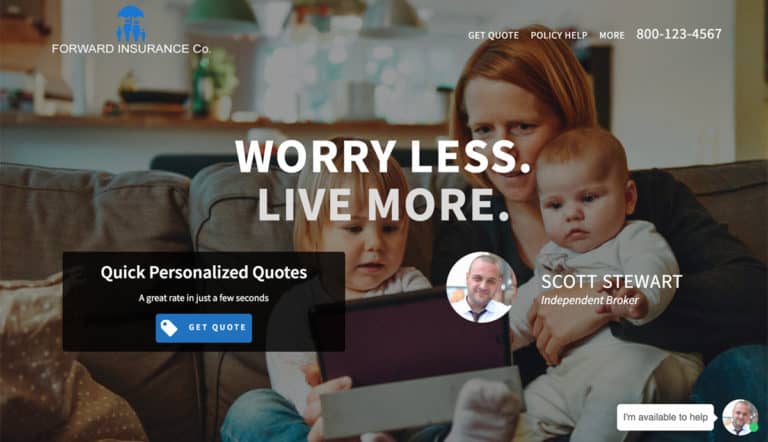Driving a car, especially a truck and a trailer, is not cheap and when you are calculating your cost of ownership you have to factor in your insurance costs.
Having adequate insurance coverage to protect you and your vehicle in the event of an accident is clearly important. For some folks pulling trailers, protecting yourself from liability for damages to your trailer is also critical.
Obviously, you maintain personal auto insurance to protect the value of your vehicle and to cover you from potential liabilities in the event of an accident. But does this same personal auto insurance coverage protect the trailer you are towing?
When you purchase trailer insurance specifically for your trailers, it covers you for such things as damages to your trailer. But for some, you might not need to purchase trailer insurance because your trailer might be covered by your personal car insurance policy.
In today’s article we will answer the questions, do I need trailer insurance, and does auto insurance cover trailers?
While most auto insurance policies will cover liability coverage for a trailer you own if it is being pulled by the insured vehicle when an accident occurs, this can vary among different policies and in different states. Additionally, factors such as the type of trailer being pulled and whether or not it is a rental will impact coverage.
For both collision and comprehensive insurance on your trailer, you might be required to buy additional coverage and list your trailer(s) on your insurance policy’s declaration page.
Keep reading for more information on whether or not your auto insurance policy covers trailers.
Are Trailers Covered by Personal Auto Insurance Policies?
If you’re in an accident while towing a trailer, your insurance company will most likely extend liability coverage on your behalf. This is because personal injury and property damage caused by a trailer is considered to be the fault of the driver in the lead vehicle. Extended coverage is typically limited in third-party liability.
If the trailer is owned and registered to a person named on the policy, then it will be covered in the situation mentioned. Personal auto insurance liability coverage does not extend to any motor vehicle attached to the insured car if it has its own motor.
It only covers trailers that are owned and registered under a person’s name, and they are simply attached to your insured car at the time of an accident.
Generally speaking, your insurance may cover your trailer when you’re transporting it for liability coverage only. But this means that if your trailer is sitting on a lot or becomes detached at any point, your vehicle insurance may no longer cover it.
Now, let’s go over some scenarios when your trailer may not be covered by your personal auto insurance policy.
What About Towing Trailers Out Of State?
If you own a trailer and are towing it in another state when it causes bodily injury or property damage to a third party, your personal auto insurance policy will typically offer liability coverage up to your policy limits.
When traveling in a state with higher liability requirements than your home state, your liability insurance limits are automatically increased to meet those requirements. You might also increase your liability limits if you are driving a different car that is not towing a trailer or are traveling in a foreign country, and you are involved in an accident for which you are determined to be at fault.
Different Types of Trailers Require Different Coverage
The type of insurance coverage you need depends on the type of trailer you own. If you are towing a utility trailer for short trips to haul a car, an ATV, or a boat, you may want extended trailer coverage. On the other hand, you will need separate insurance for a travel trailer.
If you need to tow motor vehicles behind your insurance vehicle then you would need to purchase tow vehicle insurance also referred to as towing insurance or tow truck insurance. This type of policy would cover the towing of motor vehicles.
If your trailer is covered under your personal auto insurance, you need to find out if you need an endorsement in order for the contents of your trailer to be covered under your policy.
Now, if you are using your trailer in your business then you’ll likely need commercial insurance which would not only cover your trailer but it’s contents as well.
Commercial Trailer Insurance
One of the first things you need to decide is whether your trailer will be covered by business or personal insurance. If it’s for your business, ask for commercial coverage. It’s more expensive than personal insurance, but it covers the cargo as well as the trailer.
Commercial trailer insurance requirements are not the same from state to state. Most states require you to register any commercial trailers that your company uses on their highways. In order to legally register, you must have insurance.
Here is a list of commercial trailer types that you can insure:
- Utility trailer
- Flatbed trailer
- Dry freight trailer
- Auto hauler trailer
- Bulk commodity trailer
- Concession trailer
- Dry freight trailer
- Dump body trailer or transfer box
- Pole trailer
- Refrigerated dry fright trailer
- Tank trailer
- Tractor-trailer
All states require commercial vehicle insurance for your business vehicles. This coverage includes a company’s liability if it causes an accident involving its commercial vehicle or truck. A business may be able to extend its commercial vehicle coverage to its trailers as well.
Rental Trailer Insurance Coverage
Most personal auto insurance policies don’t cover rented trailers. Additionally, credit card companies offering extended coverage on rental vehicles often won’t cover trailer rentals. If you rent a U-Haul, for example, you’ll need to purchase insurance coverage from the company itself, as the trailer likely won’t be covered under your individual personal auto insurance policy.
So, Do I Need Trailer Insurance?
If you’re involved in an accident while you’re towing a trailer, your insurance carrier will probably extend liability coverage on your behalf.
In general, when answering the common questions, “do I need trailer insurance?” and “does auto insurance cover trailers?” it is always best to check with your insurance carrier for the details on your policy regarding this potential extended coverage.
You need to specify whether or not the owner of the trailer is the same owner on the insurance policy if the trailer is a rental, the type of trailer it is, and the states in which you will be towing the trailer in.
All of these different factors can be treated differently by auto insurance policies and so it is best to confirm your coverage with your auto insurance carrier.
In some cases, depending on if you are renting or own the trailer, the type of trailer you are towing, and where you are towing it you may need to purchase additional trailer coverage on top of your auto insurance policy.
Keep in mind that minimum required liability amounts vary in different states. So, if you are towing across state lines you’ll want to confirm with your auto insurance carrier that the policy will automatically increase your liability coverage to other states you drive in.
Hopefully, your auto insurance policy has most of you covered for most of your trailer pulling needs.
If you are looking for more ways to save on your auto insurance then check out this post on the 11 cheapest cars to insure for teenagers and adults.






